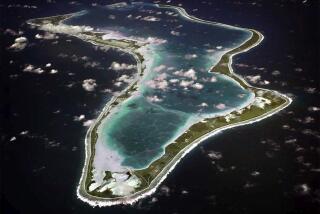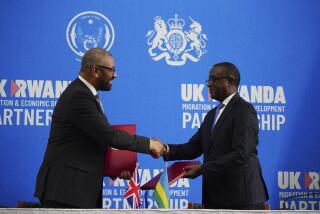Deal Clears Way for Huge New Airport in Hong Kong : China: In finally agreeing to the $16-billion British plan, Beijing scores a political and financial coup.
- Share via
China agreed Thursday to allow the construction of a major new airport in Hong Kong in exchange for winning a significant voice in the island colony’s long-term financial affairs six years before regaining sovereignty from Britain on July 1, 1997.
The deal--considered a political and financial coup for Beijing--ends more than 18 months of heated negotiations between China and Britain that had raised concerns about Hong Kong’s future. But it also calls into question the fate of Hong Kong’s bustling capitalistic economy, already strained by worries of greater control by the Communist government in Beijing.
The deal, concluded in Beijing last Sunday and announced in Hong Kong on Thursday, could have worldwide repercussions. The $16-billion airport would be one of the world’s largest construction projects and could provide contracts and work for thousands of engineers and builders during a time of global economic sluggishness.
But British concessions in the agreement give China more authority over the project, which might allow the Chinese to exclude firms from nations at odds with Beijing.
A new airport would also facilitate Hong Kong travel and trade, but the agreement raises the specter of Chinese restrictions on any long-term financial agreements between the colony and other governments or corporations.
The agreement gives China a say in any long-term financial arrangements for Hong Kong, which could test Beijing’s sincerity about the colony’s continuing economic sovereignty. For example, large long-term contracts could be vetoed by Beijing. Such pre-1997 influence was not provided in the 1984 Sino-British agreement to return Hong Kong to Chinese sovereignty.
“This is a good deal for Hong Kong,” the colony’s governor, David Wilson, told reporters. “This is the sort of arrangement we’ve been seeking for many, many months. We have all the key bits of the airport in the agreement. They don’t require further consultation.”
British Prime Minister John Major will visit China later this year to sign the airport deal.
“We’re happy to see the airport go ahead because it’s very important for Hong Kong and its future growth,” Hong Kong legislator and political activist Martin Lee told the Associated Press. “At the same time we have very serious worries about the effect of the agreement on the promised high degree of autonomy for Hong Kong, for no representative from Hong Kong participated in the mainland round of talks.”
The Chinese have agreed to allow Hong Kong to operate under a capitalist system for at least 50 years after the 1997 takeover, but residents are so concerned about the possible erosion of economic and civil liberties that they have been fleeing the colony by the thousands every year.
The airport, originally planned as Britain’s parting gift to its last colony, calls for flattening a good portion of Lantau Island, dumping 260 million cubic yards of sand and rock into the sea and building a 4,719-foot-long suspension bridge.
Although all parties agree that the airport is desperately needed because Hong Kong’s Kai Tak Airport is expected to reach capacity next year, plans hit a snag when China objected to the $16-billion price tag.
The Chinese argued that the project would leave the colony deep in debt after the British depart.
Few lenders were interested in providing funds when it was unclear whether the Chinese would continue to pay on the debt after they gain control in 1997. That forced the British to negotiate with China, even though London had maintained that it is solely in charge for the next six years.
A representative of the Bank of China will sit on the airport board, which will help determine which firms win contracts.
Britain also agreed to leave Hong Kong with no less than $3.2 billion in financial reserves. And it promised that Hong Kong would have no more than $650 million in debt to be repaid after 1997.
More to Read
Sign up for Essential California
The most important California stories and recommendations in your inbox every morning.
You may occasionally receive promotional content from the Los Angeles Times.













